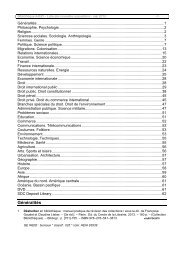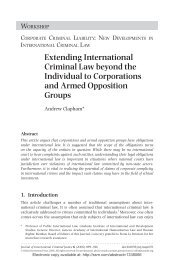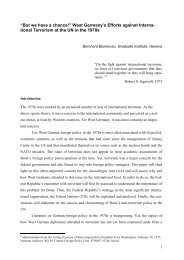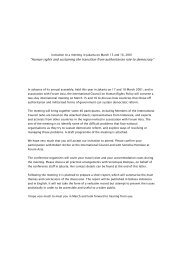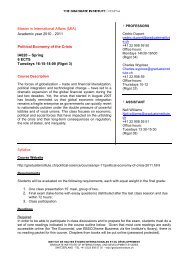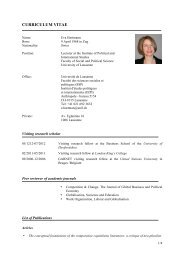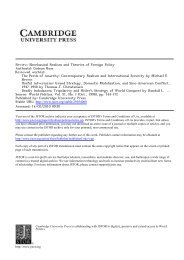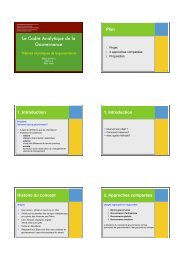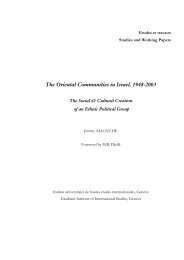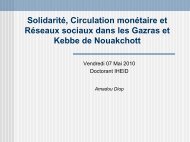Download [pdf] - The Graduate Institute, Geneva
Download [pdf] - The Graduate Institute, Geneva
Download [pdf] - The Graduate Institute, Geneva
You also want an ePaper? Increase the reach of your titles
YUMPU automatically turns print PDFs into web optimized ePapers that Google loves.
HOW PREFERENTIAL<br />
IS WORLD TRADE?<br />
Andreas Lendle, PhD Candidate in International Economics;<br />
Researcher, Centre for Trade and Economic Integration<br />
<strong>The</strong> debate about how the global trading<br />
system will be governed in the<br />
future is very much alive. <strong>The</strong> Doha<br />
Round is unlikely to be concluded any<br />
time soon, and despite the fact that<br />
most scholars and policy-makers agree<br />
that a multilaterally governed trading<br />
system is far preferable to one governed<br />
by regional or bilateral agreements,<br />
such preferential agreements<br />
are proliferating at high speed. Not<br />
only is their number increasing, but<br />
such agreements are now also envisaged<br />
between very large trading partners,<br />
such as the EU and Japan, or<br />
Japan and China.<br />
One reason why countries seem to<br />
be willing to engage actively in more<br />
and more preferential agreements,<br />
while on the other hand show little<br />
willingness to conclude the Doha<br />
Round, is arguably that the agendas<br />
are different. <strong>The</strong> Doha Round tackles<br />
issues such as agricultural subsidies<br />
and significant tariff cuts for<br />
industrial products, which are highly<br />
controversial. In contrast, preferential<br />
agreements often exclude the most<br />
contentious issues. By doing so, the<br />
level of real liberalisation achieved<br />
through such agreements is likely to<br />
be lower. However, preferential agreements<br />
also increasingly include issues<br />
that go beyond what is negotiated in<br />
the WTO.<br />
CHINA, Geely vehicles park in Shanghai harbour, ready to be exported to foreign markets. 2011. AFP/Xinhua/Han CHUANHAO.<br />
Despite this very active debate about<br />
the pros and cons of preferential trade<br />
agreements, one quite central aspect<br />
of this had so far not been analysed:<br />
how much of today’s global trade in<br />
goods is actually “preferential”?<br />
Preferential trade should be understood<br />
as trade flows for which applicable<br />
customs duties are below MFN<br />
rates (i.e. those that a WTO member<br />
grants to any other country).<br />
<strong>The</strong> result is somewhat surprising. Only<br />
around 16% of global trade flows are<br />
actually preferential. <strong>The</strong> tariff advantage<br />
for most preferential trade flows is also<br />
fairly small. Less than 2% of trade flows<br />
are eligible for preferences with a margin<br />
of more than 10% of the import value.<br />
Around half of current global trade is<br />
subject to zero MFN rates, for which a<br />
preference could not be given in any<br />
case. <strong>The</strong> remainder is dutiable trade<br />
not eligible for any preferences, and a<br />
large share of that trade faces duties<br />
below 5%.<br />
<strong>The</strong>se numbers show that despite the<br />
hundreds of FTAs currently existing,<br />
tariffs for the wide majority of global<br />
trade flows are still essentially nondiscriminatory.<br />
With new FTAs being<br />
signed, the share of preferential trade<br />
is likely to increase over the next years.<br />
While this is not good news for supporters<br />
of a multilateral, non-discriminatory<br />
global trading system, the<br />
relatively small shares of current preferential<br />
trade show that multilateralism<br />
is still very much alive. •<br />
http://voxeu.org/article/how-preferential-world-trade<br />
≥<br />
LA REVUE DE L’INSTITUT I THE GRADUATE INSTITUTE REVIEW I GLOBE I N11 Printemps I Spring 2013<br />
19


![Download [pdf] - The Graduate Institute, Geneva](https://img.yumpu.com/23370020/20/500x640/download-pdf-the-graduate-institute-geneva.jpg)
